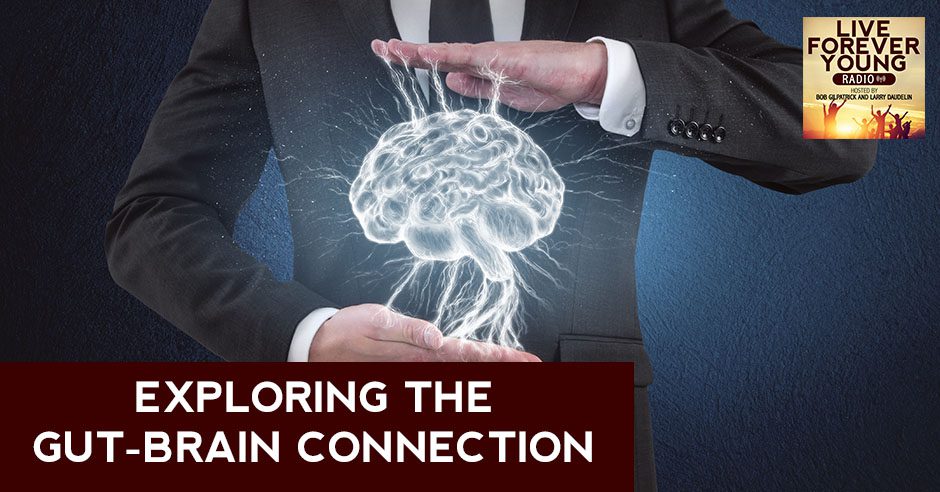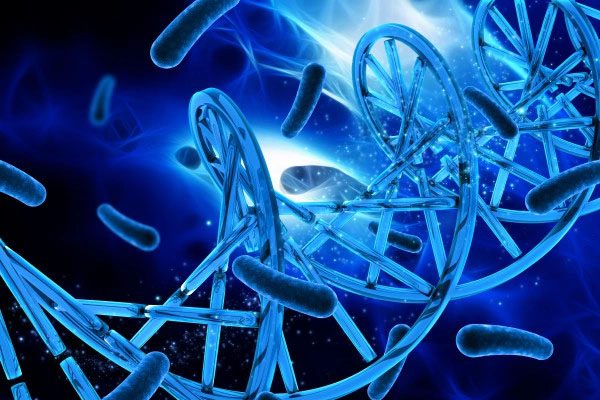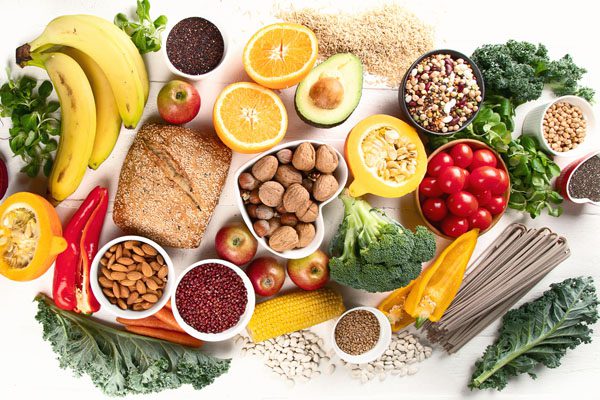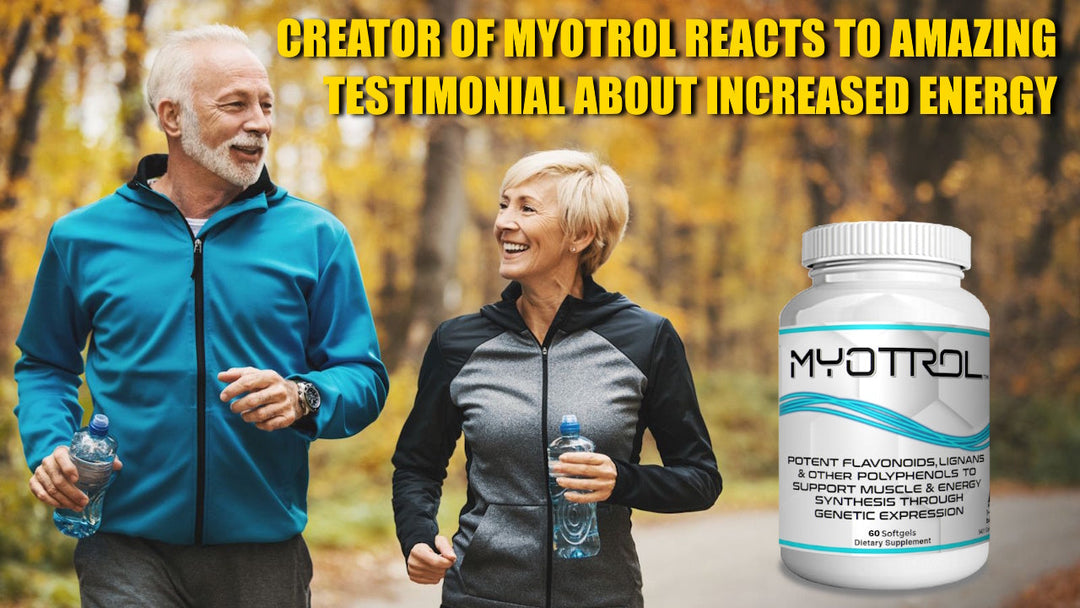Exploring The Gut-Brain Connection

Did you know that your brain health relies heavily on your gut health? It’s called the gut-brain connection, and you need to maintain its balance!
Join Bob Gilpatrick and Rollie Culp as they explore the connection between your gut and brain. Learn the important role it plays in helping your brain perform at optimal levels.
Discover some factors that can cause an imbalanced gut and what you can do to help tip the scales back in your favor. So sit back, relax, and get ready to live forever young.
Watch the podcast here:
Listen to the podcast here:
Exploring The Gut-Brain Connection
Did you know that your brain health relies heavily on your gut health? It's called the gut-brain connection. In this episode, Bob and Rollie explore the connection between your brain and gut and the importance it plays in helping you create healthy neurotransmitters so your brain can perform at optimal levels. They identify some of the main factors that can cause an imbalanced gut and poor gut health and what you can do to help tip the scales of gut health back in your favor. Sit back, relax and get ready to live forever young.---
We're going to talk about bacteria and fungi. All the stuff that doesn't sound good but is ever so important for your body. It's ever so important because we have a brain that weighs about 3 pounds. It's constantly sending signals all throughout your body. It receives signals and can regulate things.
It's like a circuit board. It's also communicating with an approximately 6-pound mass of bacteria in your gut back and forth. This is the gut-brain axis. You may not have heard about it, but it is real. It's an axis that occurs between your 3-pound brain and the 6 pounds of fungus, bacteria, viruses and anything you can imagine that lives down in that intestinal track.
We have about 100 trillion human cells. We have more bacterial cells than that. When you add up all of the bacteria, funguses and viruses together, you are about 1/10 human. We are more fungus, viruses and bacteria than anything.
Sometimes you get an overgrowth or too much bad bacteria, viruses or funguses in your body and this can cause an issue. When it's balanced, we can have good communication between our gut and brain, which is very valuable because you have neurotransmitters that are manufactured in your gut and make their way to your brain.
You also have neuropeptides that are being made. You have to keep this communication going or you would not be able to feel happy or have consciousness at all if it weren't for the goings-on in your gut with all these bacteria.
 Gut-Brain Connection: Certain types of bad bacteria are associated with specific issues. An overgrowth of one type of bad bacteria can lead to alcoholism. Another one can lead to Alzheimer's disease and so on and so forth.
Gut-Brain Connection: Certain types of bad bacteria are associated with specific issues. An overgrowth of one type of bad bacteria can lead to alcoholism. Another one can lead to Alzheimer's disease and so on and so forth.
You have this nervous system. It starts in your brain. The vagus nerve comes down and touches the lining of your gut. You have these little slivers of nerves in your gut, the enteric nervous system. Information is being passed along through that access and it goes straight up into your brain.
The vagus nerve comes up, passes through the base of your skull in the back of your skull and goes right up into your brain. It's bringing the information in the gut. Is that also the same place if you're creating neurotransmitters manufacturing and getting there as it goes up through the vagus nerve?
That's correct. You also have stuff that gets into your bloodstream as well. There are numerous ways. There are also hormonal communications between the brain and gut. It goes on and on. It's a constant loop of information and feedback about how much of what is needed.
You said a lot of it depends on the balance between good and bad bacteria. When we were looking at some information, it says you want to have about 85% good bacteria and 15% bad. When that 15% starts turning into 25%, 35%, 45% or even 50%, it's when you start getting that bad imbalance and people start noticing a lot of different things.
Not only that, but certain types of good bacteria help facilitate good communication and certain types of bad bacteria are associated with specific issues. If you have an overgrowth of one type of bad bacteria, it can lead to alcoholism. If you have an overgrowth of another type of bad bacteria, it can lead to Alzheimer's disease and the like. That's why it's important to know enough about this communication system because it's crucial to the overall health of your body.
You were saying a lot about your mood and happiness, which is we all want to be happy and usually be in a good mood. It depends on that balance and how those neurotransmitters are being made. There are some things that are natural issues with human beings that can throw off balance. The biggest one is too much sugar.
We all know. We've talked about it. Not only in inflammation and almost everything, but sugar creates a lot of issues. Also, the overuse of soap and sanitizers. Your body needs good bacteria. If you overuse the sanitizers, it could throw the balance off. Especially with COVID, everybody is using hand sanitizers every time they touch anything.
People inherit their microbiome and microflora mostly from their mom. When a baby is born, they come through the birth canal and their body is bathed in the mom's microbiome, including the microbiome that gets into their mouth. When the baby begins to breastfeed, their first meal is digested by the bacteria that was picked up during the birthing process. Upon being born, your body begins to be colonized by bacteria. There are bacteria floating in the air.
What if you have a C-section? If you have a C-section, it can create a problem. Sometimes in the birthing rooms, the nurses or doctors will use gauze to collect the fluid from the birth canal and bathe the baby with these gauze pads. That's a similar experience.
The doctors know this thing about, "If it doesn't come through the birth canal, we want to bathe them in the fluid from the birth." There were different studies. Some say that this is helpful. Some say it's a waste of time, but because some of them say it's helpful, it's probably a good idea. Also, mother's milk has lots of bacteria in it that's good bacteria.
The baby begins taking in those bacteria and begins to be colonized. The baby is fairly sterile before it's born. As soon as it begins to enter into the world, it begins to become a symbiotic relationship of bacteria, funguses and viruses. They become this interactive being. It's important for breastfeeding and for the mom to have a healthy microbiome. If the mom's microbiome is off and the baby is born into it and consumes it, it can inherit the same problems your mom had.
When you talk about creating different things in the gut, you always think to yourself, "I better be eating right," because it's like what we were talking about, the excess sugar. If you're not eating things that have enough probiotics or good bacteria in them, that's another thing that can make your imbalance bad. You want to make sure you're eating things that have natural probiotics. Pickles are one of them and sauerkraut.
Also, you want to make sure you're taking in enough fiber because the good bacteria will interact with the fiber. That's what a lot of people don't know. You got to have indigestible fiber. If you don't have fiber, then these bad bacteria have nothing to eat. Good bacteria have nothing to eat. The bad bacteria are going to feed mostly on sugar. That's why we're going to stop eating so much sugar.
You want to replace sugar with fiber that's going to survive the digestion of your stomach. It's going to make its way into your gut. Now, the bacteria will interact with it and create metabolites. That's what prebiotics are. When people ask, "What's prebiotics? Do I want to take them? What are they even?" It's the food for the probiotics, so they can eat. It's like the hay for the horses. They got to have something.
It's a fairly complex system that's going on because also what you eat will depend on what happens to the bacteria that are in your gut. Bacteria have their own DNA. As a matter of fact, if you add up the complexity of the DNA of all the different bacteria, you have about 10,000 different types of bacteria in your body. Its collective DNA is more complex by a factor of 100 in the human DNA. When you consume certain foods that have polyphenols in them, like resveratrol and lignans, they will come in to make their way to your gut.
They will activate the DNA of the bacteria, which will then make a genetic expression and release a metabolite. That metabolite and other things can stimulate the human genome. They, in turn, produce metabolites. You also have things like lignans that will come in a plant form. When they interact with the bacteria, those lignans get modified and converted into mammalian lignans, which have even more of a genetic expression capability.
Basically, it converts them into the right thing to use. The bacteria are doing this. Collectively, these 6 pounds of bacteria are working with each other. They're signaling each other and being signaled by the food we eat. In turn, the metabolites are signaling the human DNA. This is what gives rise to the metabolites that are helping create all of the metabolic pathways of the human being, including the pathways that are having, say, serotonin or dopamine, to be able to go from a supply cell and jump across the synapse into a receptor cell. This is where the magic happens and it controls your mood.
That's weird when you talk about that because that is a lot of things that are happening. The truth is none of us are doing it. It's this big ball of bacteria. If you don't have the right bacteria, the things that can happen are pretty extreme. A lot of people that don't have the right balance are going to experience stuff. We talked to a lot of people who have depression and anxiety.
That is dependent upon your bacteria and its interface with the pathways to be able to produce the right amount of dopamine, serotonin and norepinephrine. This is a triangle of neurotransmitters. They need to be in balance so that you don't feel depressed or anxious. A lot of it is dependent upon the foods that you're eating.
Too much of certain foods will trigger an overproduction of one of those three. Certain foods will produce underproduction of another one. When you have three together, there are many possibilities that can occur with all the different foods. This is an important part of health and wellness to understand. Other things that we know are problems like bipolar disorder. It's associated with an aberrant microbiome. Even schizophrenia and psychosis are all related.
That's from the inability of these bacteria to be balanced and then release the correct things in order to feel good by the dopamine and serotonin. That's pretty cool.
The other thing to watch out for is inflammation. An aberrant microbiome can create a lot of inflammation. Inflammation is a precursor and possibly the cause of Alzheimer's disease. What researchers are finding is when they do what's called FMT, which stands for Fecal Microbiota Transplant. When somebody has a severe overgrowth of bad bacteria like C. diff, it can be life-threatening.
 Gut-Brain Connection: You got to have digestible fiber. If you don't have fiber, these good bacteria have nothing to eat while your bad bacteria feed mostly on sugar.
Gut-Brain Connection: You got to have digestible fiber. If you don't have fiber, these good bacteria have nothing to eat while your bad bacteria feed mostly on sugar.
Quite often, the treatment of choice is this fecal transplant. It's a very simple procedure where they have a donor who is usually younger and has had their feces screened for a balanced microbiome. The person receiving the transplant will take an enema and vacate their lower intestine.
The liquified feces of the donor is injected into the person. They let it sit for a couple of hours and drain out. You now have a new microbiome. While doing that for control of C. diff, numerous positive side effects were noticed. One of which was that people with alcoholism started to crave less alcohol, produced less inflammation and had less inflammation in their liver, even to the point where people's lives had been saved from dying from alcoholic cirrhosis using this technique.
By simply changing or replacing the microbiome, it helped to lessen the cravings because of all these aberrant bacteria or whatever it was in the intestine. These research studies are showing less Alzheimer's disease, alcoholism, Parkinson's disease and multiple sclerosis. All are associated with inflammation to a degree, but they're also associated with neurotransmitters. Parkinson's disease is associated with a lack of dopamine.
If you don't make them correctly and then they get deposited into your brain to be used, it's like getting defective goods. You're not going to be able to function correctly.
Usually, it's a shortage. It's not enough. With Parkinson's disease, you have to have a certain level of dopamine. You have to have a certain level of receptor cells for dopamine. You have to have enough potential electrical synapse for the little babies of dopamine to ride across to land in the receptor cell. When you have a low supply of dopamine and it's usually in the corpus striatum, and a person gets one of these fecal transplants, quite often, now there's a new gut-brain connection. The dopamine levels come up and the Parkinson's disease can go away.
A fecal transplant is for extreme cases. We hear a lot about probiotics and how they can help balance. I would think that we could take a little bit less of a dramatic step and maybe start with probiotics. One of the things that a lot of people misunderstand about probiotics is it's good to get live cultures of probiotics.
You hear the CFU count, "You get a real high CFU count." What we were talking about with the prebiotics is important because if you give yourself a lot of good probiotics, but you're not intaking insoluble fiber for them to eat, they're not going to survive. Those good probiotics that you think you're going to have in your belly aren't going to survive once they get there.
Even more importantly, they're not going to create the actual metabolites. That's why we're saying it's the most important. Metabolites are simply chemical compounds that are downstream. This chemical reaction occurs and it creates this chemical. This chemical combines with this one and creates this one. Those are what are called metabolites. What we do with our probiotics, since some people are never going to get to the point where they can create metabolites themselves, some people have had their colon removed.
We do have a couple of people who have that part of them taken out. If you don't have that, how are you going to make them? You're going to have a harder time than other people. What we've done is a special processing technique where we take our sprouted barley seeds, which have a lot of fiber. We add the bacterial colonies to it and let it ferment for about 90 days. It gets stirred in a vat. It's creating these metabolites that normally would be created in your gut. In the vat, there's a little cyclonic generator that is turned on. It creates a swirling motion, which dries out the water from the sludge.
What's left is then able to be ground up into a fine powder and nutrient-stabilized. Now what you have is a powder that's loaded with pre-made metabolites. It still has fiber and bacterial colonies in it. It's got all three. It's got the living probiotics, which are the CFUs, the colony-forming units. It's got the indigestible fiber and it does come with the metabolites. You think about people who don't have the ability to create these metabolites, how much they would suffer if they can't create them. Our process of 90 days in the vat is unique. Most people, when they make probiotics, only do it for maybe a few days.
They're mostly trying to provide you with colony-forming units, CFUs, and maybe some prebiotic, but they're not trying to create the metabolites done for you. They're thinking that's going to happen down here. These metabolites, when you take them in by mouth, are going to pass through your small intestine first. Most of it is going to be absorbed in your small intestine into your bloodstream. It's not necessary for all this activity by your colony-forming units to produce all these metabolites.
People tend to get better faster when they're taking in pure metabolites. They don't have to wait for weeks or months for a new adaptation or the creation of a better microbiome. I've talked to people who had bad digestive issues and have used probiotics galore, "I've used probiotics. It doesn't work for me. It doesn't help me." I explained to them that these have these metabolites in them. I've had people call me back or reviews that I've seen that say, "I've never had probiotics work as well as these probiotics." That's probably the secret there is those metabolites are already being done.
People can get good probiotics and it can help somewhat. If they don't know which fiber to take with which of the probiotics to create the synergy, and a lot of people don't have the time or the knowledge to consume those fibers, this is a good alternative done-for-you metabolites. Rollie, that's it for now unless you can think of something else that we missed.
My gut-brain connection is strong. We went over it all.
I can't think of too much that we forgot.
Thank you, everyone, for reading.
Rollie and I will see you in the next episode.






I am Sold!!! Just read your article and can hardly wait for my order of Lignans and Probiotics to arrive.
I am going to try to fwd the article to friends and relatives who will read and uunderdtsnd!
Psmela Koh
What can I take for my blood pressure
Leave a comment